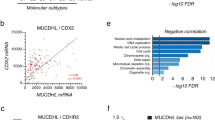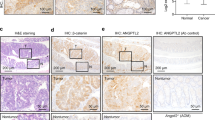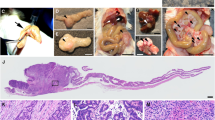Abstract
The ephrin-A1 and EphA receptors are frequently highly expressed in different human cancers, suggesting that they may promote tumor development and progression. We generated transgenic mice carrying Fabpl4xat-132 ephrin-A1, which express ephrin-A1 in the intestinal epithelial cells. Those mice were then mated with Apcmin/+ mice to produce the compound mice, which overexpress ephrin-A1 in the intestinal tumors of Apcmin/+ mice. We compared the number, size and histopathological features of the intestinal tumors in the Fabpl4xat-132 ephrin-A1/Apcmin/+ compound mice with those of the Apcmin/+ mice. The compound mice showed an increased number of intestinal tumors, significantly in the large intestine, and developed more invasive tumors. Among the 20 mice of each type examined, 5 Apcmin/+ mice developed 5 invasive tumors, 1 invasive tumor in each mouse, in the proximal or middle portions of the small intestine. On the other hand, 14 out of 20 compound mice developed 29 invasive tumors and 16 of them were in the distal small intestine and the large intestine, where transgenic ephrin-A1 was highly expressed. These results suggested that the increased expression of ephrin-A1 accelerated the malignant progression of the intestinal adenoma to invasive tumors.
This is a preview of subscription content, access via your institution
Access options
Subscribe to this journal
Receive 50 print issues and online access
$259.00 per year
only $5.18 per issue
Buy this article
- Purchase on Springer Link
- Instant access to full article PDF
Prices may be subject to local taxes which are calculated during checkout




Similar content being viewed by others
References
Abraham S, Knapp DW, Cheng L, Snyder PW, Mittal SK, Bangari DS et al. (2006). Expression of EphA2 and ephrin-A1 in carcinoma of the urinary bladder. Clin Cancer Res 12: 353–360.
Batlle E, Bacani J, Begthel H, Jonkheer S, Gregorieff A, van de Born M et al. (2005). EphB receptor activity suppresses colorectal cancer progression. Nature 435: 1126–1130.
Brantley-Sieders DM, Fang WB, Hicks DJ, Zhang G, Shyr Y, Chen J . (2005). Impaired tumor microenvironment in EphA2-deficient mice inhibits tumor angiogenesis and metastatic progression. FASEB J 9: 1884–1886.
Brantley-Sieders DM, Fang WB, Hwang Y, Hicks D, Chen J . (2006). Ephrin-A1 facilitates mammary tumor metastasis through an angiogenesis-dependent mechanism mediated by EphA receptor and vascular endothelial growth factor in mice. Cancer Res 66: 10315–10324.
Coffman KT, Hu M, Carles-Kinch K, Tice D, Donacki N, Munyon K et al. (2003). Differential EphA2 epitope display on normal versus malignant cells. Cancer Res 63: 7907–7912.
de Bruine AP, Wiggers T, Beek C, Volovics A, von Meyenfeldt M, Arends JW et al. (1993). Endocrine cells in colorectal adenocarcinomas: incidence, hormone profile and prognostic relevance. Int J cancer 9: 765–771.
Dobrzanski P, Hunter K, Jones-Bolin S, Chang H, Robinson C, Pritchard S et al. (2004). Antiangiogenic and antitumor efficacy of EphA2 receptor antagonist. Cancer Res 64: 910–919.
Eph Nomenclature Committee (1997). Unified nomenclature for Eph family receptors and their ligands, the ephrins. Cell 90: 403–404.
Hamamoto T, Beppu H, Okada H, Kawabata M, Kitamura T, Miyazono K et al. (2002). Compound disruption of Smad2 accelerates malignant progression of intestinal tumors in Apc knockout mice. Cancer Res 62: 5955–5961.
Herath NJ, Spanevello MD, Sabesan S, Newton T, Cummings M, Duffy S . (2006). Over-expression of Eph and ephrin genes in advanced ovarian cancer: ephrin gene expression correlates with shortened survival. BMC cancer 6: 144.
Huusko P, Ponciano-Jackson D, Wolf M, Kiefer JA, Azorsa DO, Tuzmen S et al. (2004). Nonsense-mediated decay microarray analysis identifies mutations of EPHB2 in human prostate cancer. Nature Genet 36: 979–983.
Kataoka H, Igarashi H, Kanamori M, Ihara M, Wang JD, Wang YJ et al. (2004). Correlation of EPHA2 overexpression with high microvessel count in human primary colorectal cancer. Cancer Sci 95: 136–141.
Kullander K, Klein R . (2002). Mechanisms and functions of Eph and ephrin signaling. Nat Rev Mol Cell Biol 3: 475–486.
Liu DP, Wang Y, Koeffler HP, Xie D . (2007). Ephrin-A1 is a negative regulator in glioma through down-regulation of EphA2 and FAK. Int J Oncol 30: 865–871.
Luongo C, Moser AR, Gledhill S, Dove WF . (1994). Loss of Apc+ in intestinal adenomas from Min mice. Cancer Res 54: 5947–5952.
Mellitzer G, Xu Q, Wilkinson DG . (1999). Eph receptors and ephrins restrict cell intermingling and communication. Nature 400: 77–81.
Murai KK, Pasquale EB . (2003). ‘Eph’ective signaling: forward, reverse and crosstalk. J Cell Sci 116: 2823–2832.
Nakamura R, Kataoka H, Sato N, Kanamori M, Ihara M, Igarashi H et al. (2005). EPHA2/EFNA1 expression in human gastric cancer. Cancer Sci 96: 42–47.
Noren NK, Foos G, Hauser CA, Pasquale EB . (2006). The EphB4 receptor suppresses breast cancer cell tumorigenicity through an Abl–Crk pathway. Nat Cell Biol 8: 815–825.
Ogawa K, Pasqualini R, Lindberg RA, Kain R, Freeman AL, Pasquale EB . (2000). The ephrin-A1 ligand and its receptor, EphA2, are expressed during tumor neovascularization. Oncogene 19: 6043–6052.
Parri M, Buricchi F, Taddei ML, Giannoni E, Raugei G, Ramponi G et al. (2005). EphrinA1 repulsive response is regulated by EphA2 tyrosine phosphatase. J Biol Chem 280: 34008–340018.
Pasquale EB . (2005). Eph receptor signaling casts a wide net on cell behavior. Nat Rev Mol Cell Biol 6: 462–475.
Potla L, Boghaert ER, Armellino D, Frost P, Damle NK . (2002). Reduced expression of Ephrin-A1 (EFNA1) inhibits three-dimensional growth of HT29 colon carcinoma cells. Cancer Lett 175: 187–195.
Powell SM, Zilz N, Beazer-Barclay Y, Bryan TM, Hamilton SR, Thibodeau SN et al. (1992). APC mutations occur early during colorectal tumorigenesis. Nature 359: 235–237.
Saam JR, Gordon JI . (1999). Inducible gene knockouts in the small intestinal and colonic epithelium. J Biol Chem 274: 38071–38082.
Simon TC, Cho A, Tso P, Gordon JI . (1997). Suppressor and activator functions mediated by a repeated heptad sequence in the liver fatty acid-binding protein gene (Fabpl). J Biol Chem 272: 10652–10663.
Straume O, Akslen LA . (2005). Strong expression of ID1 protein is associated with decreased survival, increased expression of ephrin-A1/EPHA2, and reduced thrombospondin-1 in malignant melanoma. Br J Cancer 93: 933–938.
Su LK, Kinzler KW, Vogelstein B, Preisinger AC, Moser AR, Luongo C et al. (1992). Multiple intestinal neoplasia caused by a mutation in the murine homolog of APC. Science 256: 668–670.
Surawska H, Ma PC, Salgia R . (2004). The role of ephrins and Eph receptors in cancer. Cytokine Growth Factor Rev 15: 419–433.
Swatek J, Chibowski D . (2000). Endocrine cells in colorectal carcinomas. Immunohistochemical study. Pol J Pathol 51: 127–136.
Takaku K, Oshima M, Miyoshi H, Matsui M, Seldin MF, Taketo MM . (1998). Intestinal tumorigenesis in compound mutant mice of both Dpc4 (Smad4) and Apc genes. Cell 92: 645–656.
Vogelstein B . (1990). Cancer. A deadly inheritance. Nature 348: 681–682.
Wang Y-j, Ota S, Kataoka H, Kanamori M, Li Z-y, Band H et al. (2002). Negative regulation of EphA2 receptor by Cbl. Biochem Biophys Res Commun 296: 214–220.
Wu D, Suo Z, Kristensen GB, Li S, Troen G, Holm R et al. (2004). Prognostic value of EphA2 and Ephrin-A1 in squamous cell cervical carcinoma. Gynecol Oncol 94: 312–319.
Xu F, Zhong W, Li J, Shanshen Z, Cui J, Nesland JM et al. (2005). Predictive value of EphA2 and ephrin-A1 expression in oesophageal squamous cell carcinoma. Anticancer Res 25: 2943–2950.
Yang J, Mani SA, Donaher JL, Ramaswamy S, Itzykson RA, Come C et al. (2004). Twist, a master regulator of morphogenesis, plays an essential role in tumor metastasis. Cell 117: 927–939.
Zelinski DP, Zantek ND, Stewart JC, Irizarry AR, Kinch MS . (2001). EphA2 overexpression causes tumorigenesis of mammary epithelial cells. Cancer Res 61: 2301–2306.
Acknowledgements
We thank Drs John F Rawls and Jeffrey I Gordon for providing the pBS-dBam/colon/hGHno 78 vector and Ms Aiko Nakagawa for technical help. This research was supported in part by grants-in-aid for Scientific Research from the Ministry of Education, Culture, Sports, Science and Technology, Grant-in-Aid for Cancer Research from the Ministry of Health, Labour and Welfare, and University of Tsukuba Research Project.
Author information
Authors and Affiliations
Corresponding author
Additional information
Supplementary Information accompanies the paper on the Oncogene website (http://www.nature.com/onc).
Rights and permissions
About this article
Cite this article
Shi, L., Itoh, F., Itoh, S. et al. Ephrin-A1 promotes the malignant progression of intestinal tumors in Apcmin/+ mice. Oncogene 27, 3265–3273 (2008). https://doi.org/10.1038/sj.onc.1210992
Received:
Revised:
Accepted:
Published:
Issue Date:
DOI: https://doi.org/10.1038/sj.onc.1210992
Keywords
This article is cited by
-
EPH receptor A2 governs a feedback loop that activates Wnt/β-catenin signaling in gastric cancer
Cell Death & Disease (2018)
-
The effect of ephrin-A1 on resistance to Photofrin-mediated photodynamic therapy in esophageal squamous cell carcinoma cells
Lasers in Medical Science (2015)
-
The Eph/Ephrin family in cancer metastasis: communication at the service of invasion
Cancer and Metastasis Reviews (2012)
-
Soluble ephrin a1 is necessary for the growth of HeLa and SK-BR3 cells
Cancer Cell International (2010)
-
A potential tumor suppressor role for Hic1 in breast cancer through transcriptional repression of ephrin-A1
Oncogene (2010)



